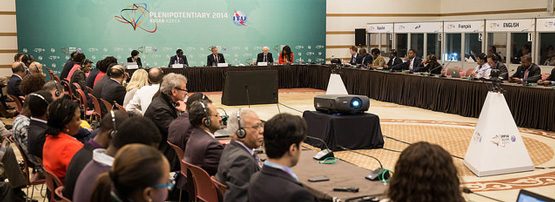
The last of the issues related to the documents in the Ad Hoc Group on Internet Related Matters were negotiated in a small group first thing Monday morning. This was related to how open the Council Working Group on the Internet (CWG) should be. A deal was brokered on Sunday evening that would see an open consultation meeting held to provide inputs into the CWG Internet. However, at a drafting group held first thing Monday morning, actually getting this down in writing highlighted some differences of opinion surrounding what status that input would have.
It caused some concern that the delicate balance struck in the consensus on Sunday may fall apart and send Resolution 102 back to the Ad Hoc. As a result, the package of Resolutions from the Ad Hoc on Internet matters won’t be discussed in the Working Group of the Plenary (WGPL) and will be held over until tomorrow.
In other related activities, a number of other matters passed through the WGPL including the highly contentious Resolution 130 on Confidence and Security. In the end, this document is a mishmash of instructions with very strict qualifications designed to ask the Secretariat to act on certain activities, but within its proper area of expertise and remit. The new draft of Resolution 130, for example, resolves “to give high priority to the work in ITU described under bearing in mind above, in accordance with its competencies and areas of expertise and to continue to work closely, as appropriate, with other relevant bodies/agencies within the UN and other relevant international bodies, taking into account the specific mandates and areas of expertise of the different agencies and while being mindful of the needs to avoid duplicating work between organizations and among the bureaus or the General Secretariat”.
All the same, the document passed through the WGPL without being contested and will now be passed to the Plenary of the Conference for final processing and acceptance.
Similarly, the WSIS Resolution, number 140, was passed without comment. Although this had taken some time to negotiate there was substantial agreement on the general idea behind the proposed changes. The changes were mostly updates related to the ongoing nature of the WSIS review process that is currently in process and will culminate in an outcome as a result of the UNGA (United Nations General Assembly) Overall Review in December 2015.
A big surprise was an outcome to the highly contentious matter of Non-Discriminatory Access To Modern Telecommunication/Information And Communication Technology Facilities, Services And Applications, Including Applied Research And Transfer Of Technology, On Mutually Agreed Terms. This is a highly charged geo-political issue and includes a submission from Cuba that says, in part, that the governments of the Member States of the Union should “refrain from taking any unilateral and/or discriminatory actions that could impede another Member State from accessing public Internet sites and telecommunication resources or from acquiring new telecommunication technologies and modern telecommunication/ICT facilities, services and related applications, within the spirit of Article 1 of the ITU Constitution and the principles of WSIS”.
That text never made it into the final draft, but the following invitation to Member States was approved; “invites Member States to refrain from taking any unilateral and/or discriminatory actions that could impede technically another Member State from full access to the Internet, within the spirit of Article 1 of the Constitution and the WSIS principles”.
Resolution 179 on the ITU’s role in child online protection also passed through the WGPL, as did Resolutions 172 and 182.
The views expressed by the authors of this blog are their own and do not necessarily reflect the views of APNIC. Please note a Code of Conduct applies to this blog.
